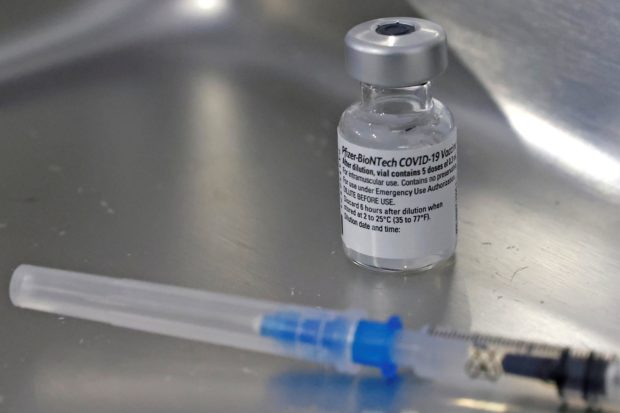New warning on vaccine supplies sparks EU concern

In this file photo taken on December 28, 2020 a syringe and a vial of the Pfizer-BioNTech COVID-19 vaccine are seen at the medical centre of Tzrifin military base in the Israeli town of Rishon Lezion. – German firm BioNTech said on Januar 1, 2021 it was racing to ramp up production of its Covid-19 jab in Europe, to fill the “gap” left by the lack of other approved vaccines. The vaccine developed by BioNTech and its US partner Pfizer was the first to be approved in the European Union in late December. (Photo by JACK GUEZ / AFP)
PARIS, France – A warning from AstraZeneca that initial supplies of its Covid vaccinations to Europe will be lower than expected has sparked fresh concern over the rollout of inoculations, forcing some countries to plan for a sharp drop in deliveries.
Friday’s announcement by the British pharmaceutical firm followed another last week by Pfizer, which said it would delay shipments of its vaccine for up to a month due to works at its key plant in Belgium.
The companies’ warnings come amid deepening concern over new Covid-19 variants, particularly one that emerged in Britain and which is believed to be more infectious than the original strain.
Overall, Europe has now recorded more than 692,000 deaths and nearly 32 million infections.
The European Union has so far approved vaccines from Pfizer and its German partner BioNTech as well as from US company Moderna. It has not yet approved the vaccine from AstraZeneca and its partner the University of Oxford, but is expected to make a decision by January 29.
Article continues after this advertisementAstraZeneca said in its statement that if EU approval was granted, the “initial volumes will be lower than anticipated”, although the start would not be delayed.
Article continues after this advertisementThe company blamed “reduced yields at a manufacturing site within our European supply chain”.
It would in any case supply the EU with “millions of doses” while ramping up production in February and March, it added.
The announcement led to “deep dissatisfaction” from EU member states, which “insisted on a precise delivery schedule”, said European Health Commissioner Stella Kyriakides.
‘Very, very bad news’
Austrian Health Minister Rudolf Anschober called it “very, very bad news” and said his country would receive in February only slightly more than half the 650,000 AstraZeneca doses it had expected.
Lithuania said it was expecting an 80-percent reduction in AstraZeneca doses in the first quarter.
Irish Prime Minister Micheal Martin said of the delay. “It will disrupt our plans.”
Italy’s Prime Minister Giuseppe Conte meanwhile said in a post to his Facebook page that the government was considering legal action against AstraZeneca’s “unacceptable” announcement.
“If the 60 percent reduction in doses that will distributed in the first quarter should be confirmed, that would mean that 3.4 million doses would be delivered to Italy instead of eight million doses,” he wrote.
Belgian Health Minister Frank Vandenbroucke, speaking on public television, said the government had a contract with AstraZeneca for 1.5 million vaccine doses in the first quarter.
Now “AstraZeneca says it will be half, instead of 1.5 million there will be 650,000,” he said, calling it “very bad news” while conceding that there can be production problems given the complicated process.
Some government officials however sought to reassure their countries — weary and battered by months of the pandemic and already on edge over slow vaccination rollouts.
“We have new vaccines on the way. We have Pfizer, which is increasing its production capacities,” French industry minister Agnes Pannier-Runacher told French radio.
Prime Minister Jean Castex announced on Saturday that France had now passed the one-million vaccination marker.
The EU initially ordered up to 400 million doses of the AstraZeneca vaccine, and in total has secured contracts for more than two billion vaccine doses for a total population of 450 million.
The AstraZeneca vaccine has the advantage of being cheaper to produce and being simpler to store and transport than its rivals.
‘Disappointment’
German Health Minister Jens Spahn said that after the jab’s expected approval in a week’s time “there will be AstraZeneca deliveries in February”.
But he added: “How much, we must still clarify with AstraZeneca and the European Union in the days ahead.”
Sweden’s national vaccination coordinator Richard Bergstrom said he expected his country to receive around 700,000 doses in the first month after the vaccine was authorised compared to one million expected initially.
Norway, which is not an EU member but which follows decisions made by the bloc’s EMA regulator, expressed “disappointment”.
Its health authority now expects to receive only 200,000 AstraZeneca doses in February — far less than the 1.12 million initially expected.
Meanwhile, the Pfizer delay announced last week was continuing to cause criticism.
Pfizer said on January 15 that modifications at its Puurs factory were necessary to ramp up vaccine production capacity from mid-February.
“We believe that Pfizer is currently at fault,” Domenico Arcuri, Italy’s special commissioner for the pandemic, told La Stampa newspaper on Saturday, confirming the country planned to pursue legal action against the company.
“The 20-percent reduction in Pfizer vaccine supplies is not an estimation, but a sad certainty,” he said, adding that Italians’ health was not “negotiable”.
French European Affairs Minister Clement Beaune on Friday called on Pfizer to “honour its commitments”,
gsg
For more news about the novel coronavirus click here.
What you need to know about Coronavirus.
For more information on COVID-19, call the DOH Hotline: (02) 86517800 local 1149/1150.
The Inquirer Foundation supports our healthcare frontliners and is still accepting cash donations to be deposited at Banco de Oro (BDO) current account #007960018860 or donate through PayMaya using this link.